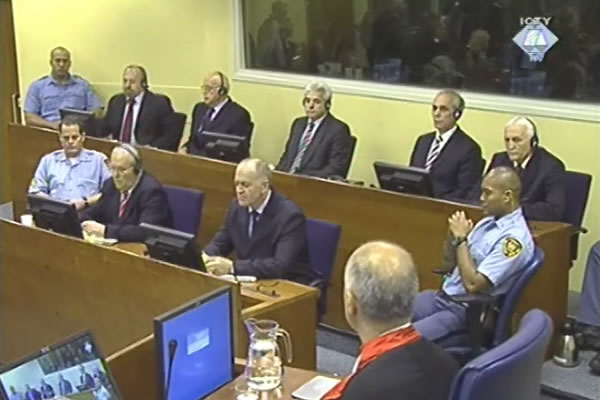Home
TWO LIFE SENTENCES AND 89 YEARS IN PRISON FOR GENOCIDE AND OTHER CRIMS IN SREBRENICA AND ZEPA
The Trial Chamber today handed down its judgment to the seven Bosnian Serb military and police officers, finding that the prosecution proved beyond reasonable doubt that the accused committed all the crimes alleged in the indictment, except deportation: genocide, conspiracy to commit genocide, extermination, murder, cruel and inhumane treatment, terrorizing civilians, persecution and forcible removal of population
 Vujadin Popovic, Ljubisa Beara, Drago Nikolic, Ljubomir Borovcanin, Vinko Pandurevic, Radivoj Miletic and Milan Gvero in the courtroom
Vujadin Popovic, Ljubisa Beara, Drago Nikolic, Ljubomir Borovcanin, Vinko Pandurevic, Radivoj Miletic and Milan Gvero in the courtroom Crimes perpetrated in July 1995 are ‘arrestive in their scale and brutality’ in the context of the war in the former Yugoslavia, but also in the context of ‘human history’, the Trial Chamber stated today in its judgment handed down to the seven Bosnian Serb military and police officers for the crimes in Srebrenica and Zepa. In the judgment, the Trial Chamber found it was proven beyond reasonable doubt that all crimes listed in the indictment, except deportation, were indeed committed: genocide, conspiracy to commit genocide, extermination, murder, cruel and inhumane treatment of civilians, terrorizing civilians, persecution and forcible removal of population. Finding all the accused guilty, the Trial Chamber sentenced them to prison sentences ranging from five years to life.
[IMAGE]4795[/IMAGE]The harshest sentence, life in prison, was imposed on Vujadin Popovic and Ljubisa Beara. At the relevant time, Popovic was chief of security in the Drina Corps; Beara was chief of security in the VRS Main Staff. Both Popovic and Beara were found guilty of genocide, extermination, murder and persecution on political, religious and racial grounds. Popovic “knew that the intent was not just to kill those who had fallen into the hands of the Bosnian Serb Forces, but to kill as many as possible with the aim of destroying the group”. Popovic, the judgment noted, ‘not only knew of this intent to destroy, he also shared it’. Ljubisa Beara shared the same intent to perpetrate genocide, the Trial Chamber went on in its judgment, and was ‘a driving force behind the murder enterprise’. Beara ‘had the clearest overall picture of the massive scale and scope of the killing operation’.
[IMAGE]4796[/IMAGE]The third accused Drago Nikolic was chief of security in the Zvornik brigade, during Srebrenica operation. Nikolic ‘participated in the joint criminal enterprise to murder’ and acted together with Popovic and Beara. Although the judges found he was aware that the murders were committed with a genocidal intent, they were not convinced that Nikolic shared Popovic’s and Beara’s genocidal intent. He was found guilty of aiding and abetting genocide, extermination, murder and persecution and was sentenced to 35 years in prison.
[IMAGE]4797[/IMAGE]Ljubomir Borovcanin, commander of the Republika Srpska MUP joint forces deployed in the Srebrenica operation, was found guilty of aiding and abetting extermination, murder, persecution and forcible removal of population. Borovcanin was also found guilty on the basis of command responsibility on two counts of murder, for failing to punish his subordinates who took part in the killing of prisoners in front of the warehouse in Kravica. For these crimes, Borovcanin was sentenced to a single sentence of 17 years in prison.
[IMAGE]4798[/IMAGE]According to the judges, General Radivoje Miletic, chief of operations and training in the VRS Main Staff, drafted the Directive 7, an order signed by Radovan Karadzic, defined by the judges as a ‘criminal plan’. The judgment concluded that Miletic contributed to creating unbearable living conditions for the people in the Srebrenica and Zepa enclaves by restricting the access of humanitarian convoys. He thus contributed substantially to the joint criminal enterprise to forcibly remove the population. He was found guilty of murder, persecution and inhumane acts of forcible transfer, and was sentenced to 19 years in prison.
[IMAGE]4799[/IMAGE]General Milan Gvero, Mladic’s assistant commander for moral, legal and religious affairs in the VRS Main Staff ‘played an important role in the Srebrenica and Zepa operations’, the Trial Chamber found. Gvero also took part in drafting the Directive 7 and was thus aware of the plan to forcibly remove the population in the enclaves. The Trial Chamber concluded that Gvero’s contribution to the joint criminal enterprise was substantial, and found him guilty of persecution and inhumane acts of forcible transfer. Having taken into account some mitigating circumstances, the Trial Chamber sentenced him to 5 years.
[IMAGE]4800[/IMAGE]Finally, former commander of the VRS Zvornik Brigade Vinko Pandurevic was found guilty of aiding and abetting murder, persecution and forcible removal of population and on the basis of command responsibility for failing to prevent and punish his subordinates who committed the murders. Pandurevic received a sentence of 13 years in prison. In Pandurevic’s case, the Trial Chamber took into account some mitigating circumstances: Pandurevic’s decision to open the corridor which allowed thousands of Bosniaks to cross into BH Army-controlled areas on 16 and 17 July. Here Pandurevic acted in contravention of his superiors’ orders.
The prosecution today expressed its satisfaction with the judgment in the Srebrenica Seven case, in particular with the finding that confirmed that genocide was committed in Srebrenica in July 1995.
Linked Reports
- Case : Popovic et al. - "Srebrenica"
- 2009-09-11 DEFENSE: ACCUSATIONS AGAINST MILETIC AND GVERO REMAIN ‘UNPROVEN’
- 2009-09-10 DEFENSE: ‘DEFORMED EVIDENCE’ OF THE PROSECUTION
- 2009-09-09 DEFENSE POINTS OUT TO ‘PROSECUTION OMISSIONS’
- 2013-10-03 APPELLATE HEARING IN ‘SREBRENICA FIVE’ CASE SCHEDULED
- 2013-12-02 SREBRENICA ‘FIVE’ BEFORE APPEALS CHAMBER
- 2013-12-03 BEARA WANTS GENOCIDE CONVICTION QUASHED
